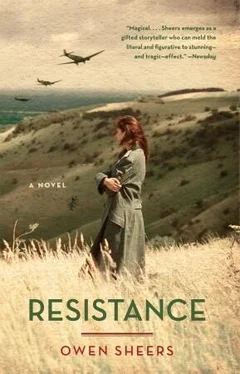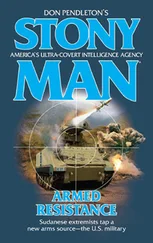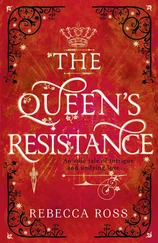The dress’s neckline held her hair for a moment, then let it go all at once so it fell heavily about her shoulders. She sat on the edge of the bed, put on her knickers, a vest, and began balling a pair of woollen stockings over her hand, her forehead puckered in a frown. Catching herself in the dressing-table mirror she paused and ran a finger up the bridge of her nose between her eyebrows. A slight crease was forming there. She’d only noticed it recently; a short line that remained even when her brow was relaxed. Still sitting on the edge of the bed she gathered up her hair and, turning her profile to the mirror, held it behind her head with one hand, exposing her neck. That crease was the only mark on her face. Other than that her skin was still smooth. She turned the other way with both hands behind her head now. She should like a wedding to go to. Or a dance, a proper dance where she could wear a dress and her hair up like this. That dress Tom bought for her on their first anniversary. She couldn’t have worn it more than twice since. Tom. Where was he? She dropped her hair and pulled on her stockings. Reaching into the dressing-table drawer, she put on a blouse and began doing up the buttons, the crease on her forehead deepening again.
Bad news had been filtering into the valley every day for the last few weeks. First the failed landings in Normandy. Then the German counterattack. The pages of the newspapers were dark with the print of the casualty lists. London was swollen with people fleeing north from the coast. They had no phone lines this far up, and apart from Maggie’s farm, which sat higher in the valley, the whole area was dead for radio reception. But news of the war still found its way to them. The papers, often a couple of days old, the farrier when he came, Reverend Davies on his fortnightly visits to The Court, all of them brought a trickle of stories from the changing world beyond the valley. Everyone was unnerved but Sarah knew these stories had unsettled Tom more than most. He rarely spoke of it, but for him they threw a shadow in the shape of his brother, David. David was three years younger than Tom. He’d had no farm of his own so he’d been conscripted to fight. Two months ago he was declared missing in action and, while Tom maintained an iron resolve that his brother would appear again, the sudden shift in events had shaken his optimism.
For Sarah news of the war still seemed to have an unreal quality, even when a few days ago the names of the battlegrounds changed from French villages to English ones. There were marks of the conflict all about her: the patchwork of ploughed fields down by the river once kept for grazing; the boys from her schooldays, and the farmhands, many of them gone for years now. But unlike Tom she didn’t have a relative in the fighting. Her own older brothers had been absent from her life ever since they’d argued with her father and broken from the family home when she was still a girl. They’d bought a farm together outside Brecon, large enough to have saved them both from the army. So Sarah didn’t possess that vital thread connecting her to the war that brought the news stories so vividly to life for so many others. There were women here, in the valley, who had lost sons, and in the early years she’d seen other mourning mothers and wives in Longtown and Llanvoy. But even these women, with their swollen eyes and dark dresses, seemed to have passed into a different place, a parallel world of grief. The sight of them evoked sympathy in Sarah, sometimes a flush of silent gratitude that Tom was in a reserved occupation, but never empathy.
Only once in the last five years had the war really impacted upon her. When the bomber crashed up on the bluff. Then, suddenly, it had become physical. She’d been woken by the whine of its dive followed by the terrible land-locked thunder of its explosion. Tom held her afterwards, speaking softly into her hair, “Shh, bach, shh now.” In the morning they’d all gone up to look. Tom and she took the ponies. When they got there the Home Guard and the police from Hereford had already put a cordon around the wreckage so they just stood at a distance and watched, the thin rope singing and whipping in the hilltop wind. Beyond the crashed plane she’d glimpsed a tarpaulin laid over a shallow hump. “One of the crew,” Tom had said with a jerk of his chin. She’d agreed with him. “Yes, must be,” although she’d thought the hump looked too small, too short, to be the body of a man. The ponies shifted uneasily under them, pawing the ground, tossing their heads. They were disturbed by this sculpture of twisted metal that had appeared on their hill, by this charred and complicated limb half embedded in the soil as if it had erupted from the earth, not fallen from the sky. And so was Sarah. She’d heard about the Blitz, and about Liverpool and Coventry, its cathedral burning through the night. She’d even seen their own bombers out on training runs. But she’d never seen an enemy plane before. Usually they were just a distant drone to her, a long revolving hum above the clouds as they returned from a raid on Swansea or banked for home after emptying their payloads over Birmingham. But now, here was one of them, on the hill above her farm. Massive and perfunctory. So ordinary in its blunt engineering. And under that tarpaulin was a real German. A man from over there who had flown over here to kill them.
She dressed quickly in a long skirt and cardigan and went downstairs to pull on her boots in the porch by the kitchen door. As she bent to lace them, she noticed Tom’s weren’t there. Not just his work boots but his summer ones too; both pairs were missing. She stared for a moment at the space where they’d been, four vague outlines in a scattering of dust blown in under the door. Leaning forward on her knee, she touched one of these empty footprints as if it could tell her where he’d gone. But there was nothing, just the cold stone against her fingertips. She shook her head. What was she doing? She stood up, took her coat from the hook on the back of the door, pushed her arms through its sleeves, and drew its belt tight about her waist. Lifting the door’s latch she stepped out into the brightness of the cobbled yard where the day fell in on her with a cool wash of air. She breathed in deeply, feeling the first metallic tang of autumn at the back of her throat. Shards of sunlight reflected off the stones. The dogs barked faster and louder to greet her. She moved towards them and they settled back on their haunches, stepping the ground with their forepaws, quivering with anticipation as if a voltage ran under their skins.
The dogs, let loose of their chains, wove and slipped about her as she walked up the slope across the lower paddock and through the coppiced wood behind the farm. The extra hours of restraint had charged them with a frantic energy and they raced ahead of her, ears flat, before doubling back, their sorrowful eyes looking up at hers, their heads low and their coats slickly black in the dappled sunlight. Sarah, in contrast, felt her legs heavy and awkward beneath her. She took the slope with more pace, pressing the heels of her palms into her thighs with each step. Twice she found herself stopping to rest against the trunk of a tree. She was twenty-six years old, worked every day and was usually through this wood before she knew it, but this morning it was as if one of the dogs’ chains had snagged around her feet and was dragging her back down the hill with every step she took.
Ten minutes of this stop-start walking brought her out of the wood and across their upper land until she stood on the edge of the top field where the cultivated valley gave to the hill, the mapped countries of bracken tapering to meet the sheep-cropped grass. She sat down with this bracken at her back. Picking at a few fronds, already rusting at their tips, she looked out over the valley.
Читать дальше












